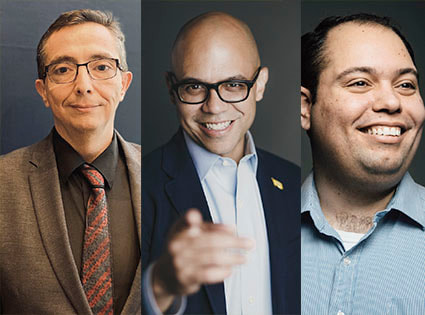Latino politicians making a difference
Politics is not just a phenomenon that occurs at national and international levels. While it is easy to overtly focus on the captivating discussions that occur at the national level or spend time thinking about the future of the international order, there is a layer of politics that is often neglected: local and state politics. Surprisingly, this layer is the one that has a bigger impact on daily life. Local and state politics determine important aspects that we all interact with, schools, transit, libraries, fire departments, police departments, and many more. Additionally, it’s the layer where individuals can have the most influence. So, this is a great opportunity to be involved. There are some Latino politicians who are working to make a difference. We talked with just a few of them to learn about their experiences and what they can teach us.
For Felix Rivera, a representative of Midtown in the Anchorage Assembly, his work in politics started as an effort to protect LGBTQIA+ rights. “In 2011, I became involved in a political movement to try and add sexual orientation and gender identity to the city’s non-discrimination laws.” While that initial effort was not successful, he remained interested in local politics, especially pedestrian safety. “From 2008 to early 2012, I had no vehicle, so my only form of transportation was using the People Mover bus system. It is a great system, but as soon as you get off the bus in the winter, you experience firsthand the public policy failure,” Rivera mentioned in an interview. The danger caused by ice and snow inspired him to make a difference and now he continues to do so because he firmly believes in the importance of being involved locally: “what impacts your daily life the most is what happens in your own backyard, not what happens in D.C. Local politics and the decisions that local policymakers make play a critical role in the quality of life, in the education of your children, and so much more.” Everyone can serve in their way. Civic engagement does not only mean running for office. It also can take the shape of attending public meetings, volunteering, and staying up to date with local news. George Martinez argued that often being involved can take a quieter form: “Serving the community doesn’t have to be in the form of grand acts or gestures. It doesn’t have to be loud or visible. I learned long ago that there are many ways to serve your community, and most of the ways to serve the community don’t require any titles. Just a commitment to doing the right thing when you have the opportunity.” His interest in politics started when he was very young “growing up as a child of a single mother on public assistance. I was forced to learn about stubborn bureaucracies and bad public policy, which inspired me to want to understand the politics controlling it.” Now, he is running to represent East Anchorage in the Anchorage Assembly, but he sees this as more than just a title: “For me serving in the Assembly is about bringing people together to achieve practical solutions toward building a beloved community.” However, being involved in local politics can also come with its challenges and, at a time when there’s so much polarization and negative perceptions it is easy to get discouraged. However, for Erick Cordero, an experienced campaign manager, and legislative staffer who now focuses on communications and government relations at a policy think tank, the reality is more optimistic. He mentioned: “There is a lot of pessimism and toxicity in the media, especially social media. In reality, things are not as divided as they appear once you work there and see how things are. What you read online is not reality, but perception.” His current work involves working with data and research to advocate for specific issues and, he recommends the power of research for those thinking about getting involved: “Make sure you do your research before you jump into an issue. Be mindful of others’ views, especially those you disagree with. Never stop learning!” Being involved matters, and while at times it can be frustrating, it’s always worth it, but it requires patience. This is something that George reminds those wanting to get involved in their community: “Don’t forget that deep and sustainable change happens over time through persistent, hard work and focus.” After all, and just as Felix Rivera said: “decisions are made by those who show up and use their voice”. So, it’s time for everyone to get involved, no matter their gender, age, or nationality, we can all be involved in our own way to make a difference! |
